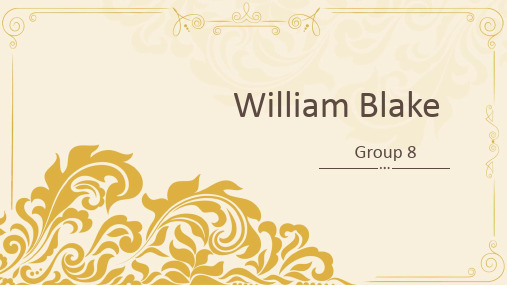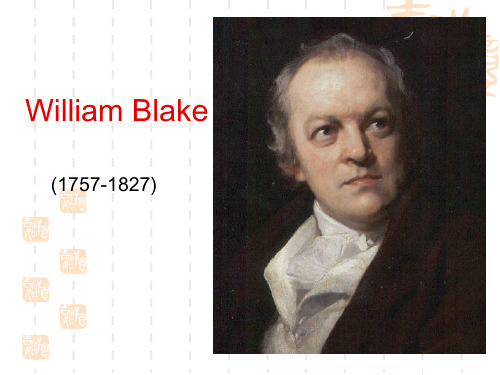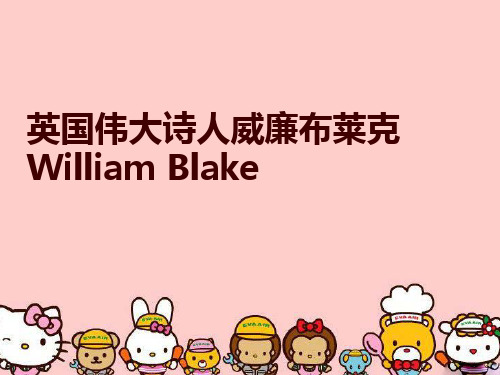LondonByWilliamBlake作品赏析课件
布莱克的伦敦诗歌鉴赏

布莱克(William Blake)是18世纪末19世纪初的英国浪漫主义诗人和艺术家,他的伦敦诗歌是他作品中的重要组成部分。
以下是对布莱克的伦敦诗歌进行的简要鉴赏:布莱克的伦敦诗歌以揭示城市现实中人们的苦难和压抑为主题,通过诗人独特而激起共鸣的方式表达了他对社会不公和人类困境的关注。
他运用生动的形象、深邃的意象和强烈的表达力,使诗歌具有强烈的感染力。
其中最著名的伦敦诗歌包括《伦敦》和《经验之歌》。
《伦敦》描绘了城市的黑暗和不公,通过对街头、河流和教堂等场景的描写,表达了人们心灵的枷锁和社会的束缚。
《经验之歌》则通过“经验小男孩”的视角,展现了人们欲望和受压抑的内心世界。
这些诗歌中流露出对社会制度和道德观念的质疑,以及对人类灵魂自由和解放的渴望。
布莱克的伦敦诗歌还强调了个体的价值和尊严。
他谴责了社会的剥削和压迫,并提倡个体的自由和真实性。
通过对工人和儿童等弱势群体的关注,他揭示了人类的困境和不平等,并呼唤悲悯、同情和社会变革。
总体而言,布莱克的伦敦诗歌以其深邃而独特的艺术表达和对社会问题的关切而被广泛赞赏。
他通过诗歌唤起读者对人类境遇的思考,同时也以其对个体自由和人性尊严的探索,成为浪漫主义文学中的杰出代表。
London--William Blake鉴赏

william blake london解析

William Blake是18世纪英国最杰出的诗人、画家和创作家之一,他的作品被认为是浪漫主义文学的代表作之一。
其中《London》是他的代表作之一,描绘了当时伦敦城的景象,表达了他对城市中贫穷和不公的深刻关注和批判。
本文将对《London》进行解析,探讨其背后隐藏的意义和价值。
一、背景介绍1.1 William Blake简介William Blake(1757-1827)是18世纪末、19世纪初英国浪漫主义文学和美术的先驱者,他的作品充满了对社会不公、人性冲突和信仰的探讨。
他的绘画作品和诗歌作品均受到了后世的广泛赞誉。
1.2《London》简介《London》是William Blake的一首诗歌作品,最早出现于《Songs of Experience》(经验之歌)集中。
诗中描绘了18世纪末期伦敦城的贫困、污秽和不公,展现了一幅鲜明的社会画卷。
这首诗被视为对当时社会现实的抨击,同时也是对人性、存在和信仰的反思。
二、诗歌解析2.1 诗歌整体风格和结构《London》是一首由四个四行组成的简短诗歌,每一句都节奏明快、语言简洁,却又富有深刻的内涵。
整体的韵律和情感流露都表现出诗人对当时伦敦社会的悲愤和不满。
2.2 伦敦城的描绘诗中通过描述伦敦城的风景和景象,展现了当时城市中的贫困、污秽和不公。
诗句中的“街头的每个脸上都写满了悲伤之情”,以及“每个宫殿的每条街道都有苍白的双脸”的表述,都展现了对城市中贫穷和不公的深刻关注和批判。
2.3 社会现实的批判诗歌中通过对城市景象的描绘,隐含着对当时英国社会现实的批判。
诗中提到的“酒馆的每个发抖的人”和“每个宫殿烟囱中的哀叹”,都充满了对当时社会贫困与不公的愤慨。
诗歌语言间的悲愤和不满,呈现出诗人对社会现实的强烈关注和批评。
2.4 人性、存在和信仰的反思除了对社会现实的批判外,诗中还展现了对人性、存在和信仰的深刻反思。
诗句“黑色的教堂与黑色的城市融为一体”,表现了对当时宗教虚假与道德堕落的质疑。
William-Blake-个人及作品风格介绍 PPT

Group 8
Content
1. Author 3.Background
2.Introduction 4.Stylistic Features
PART ONE author
His life
1. Early life
2. Later life and career
3. Turning point
PART TWO
Introduction
THE CHIMNEY SWEEPER
"The Chimney Sweeper" is the title of a pparts in Songs of Innocence in 1789 and Songs of experience in 1794. The poem "The Chimney Sweeper" is set against the dark background of child labour that was prominent in
England in the late 18th and 19th century. At the age of four and
five, boys were sold to clean chimneys, due to their small size. These children were oppressed and had a diminutive existence that was socially accepted at the time.
later poem, an apparently adult speaker encounters a child
William-BlakePPT课件

He'd have God for his father, and never want joy. And so Tom awoke, and we rose in the dark,
诉汤姆, 如果他是一个乖小孩 上帝会是他的父亲 并且将永不欠缺喜乐。
And got with our bags and our brushes to work. 汤姆醒了过来,我们也都在黑暗中起床
And so he was quiet, and that very night,
嘿汤姆,不要理会你的头发, 当没了你的头发 你会知道煤 灰不再可能弄脏你金黄的头 发。
.
他安静了下来,而且就在那11
一夜
当汤姆沉睡时,他看到这样的一幅图
像千百个扫烟囱的小孩,狄克、乔伊、
As Tom was a-sleeping, he had such a sight! - 涅德与杰克
突地来了一位天使带着一把明亮的钥匙打开了棺木盒让所有的小孩起身出在青翠的草原上这些小孩尽情笑着跑着他们沐浴在溪流中并且在阳光下躺裸着身子洁白干净他们的工具袋抛在一旁他们在云间跳跃在风中嬉闹天使告诉汤姆如果他是一个乖小孩上帝会是他的父亲并且将永不欠缺喜乐
William Blake
(1757-1827)
The theme
.
13
the soul word
▪ angel There are so many poor children.No one loves them,so they can only hope that the angels.The children like Tom,they all have miserable lives .But they still have sweet dream and nice wish.
英国伟大诗人威廉布莱克-William-Blake市公开课一等奖省赛课微课金奖PPT课件

Questions for Discussion
1.Make a Comparison between Songs of Innocence and Songs of Experience.
• Language/ tone/ theme 2. Make a tentative
Interpretation of the following poem:
But most thro’ midnight streets I hear How the youthful Harlot’s curse Blasts the new born Infant’s tear, And blights with plagues the Marriage hearse.
The Romantic Period
• Neoclassicism: reason, order, accuracy and elegant wit
• Romanticism: passion, emotion, and natural beauty
The romantic period is an age of poetry.
“Piper, sit thee down and write In a book, that all may read.” So he vanish’d from my sight, And I pluck’d a hollow reed,
13/19
And I made a rural pen, And I stain’d the water clear, And I wrote my happy songs Every child may joy to hear.
William Blake威廉布莱克及作品英国文学家ppt课件

给你生命,把你喂养 在溪流旁的草场; 给你柔软,发亮 毛绒绒的衣裳;
Gave thee such a tender voice,
Making all the vales rejoice?
Little Lamb, who made thee?
Dost thou know who made thee?
一沙一世界,一花一天堂。 无限掌中置,刹那成永恒。 ——徐志摩(译)
佛曰:
• 一花一世界, • 一草一天堂, • 一叶一如来, • 一砂一极乐, • 一方一净土, • 一笑一尘缘, • 一念一清静。
这一切都是一种心境。心若无 物就可以一花一世界,一草一 天堂。参透这些,一花一草便 是整个世界,而整个世界也便 空如花草。
2. What does Lamb stand for?
“The Tiger”
The Tyger / 老虎 (I)
(郭沫若译)
• Tyger! Tyger! Burning bright • In the forests of the night, • What immortal hand or eye • Could frame thy fearful symmetry?
• a recognition of the claims of passion and emotion,
• by a renewed interest in medieval literature.
• In England, this movement showed itself in the trend of Pre-Romanticism in poetry.
• 给你这样柔美的声音,
• 使所有的山谷都欢畅?
最新英国伟大诗人威廉布莱克 William Blake精品课件

1.Imagination is the vital faculty that creates new wholes out of disparate elements.
2.It is in solitude, in communion with the natural universe that man can exercise this most valuable faculty.
3. Songs of Experience
• Presenting a world of misery, poverty, disease, war and repression with a melancholy tone
Questions for Discussion
1.Make a Comparison between Songs of Innocence and Songs of Experience.
“Piper, sit thee down and write In a book, that all may read.” So he vanish’d from my sight, And I pluck’d a hollow reed,
And I made a rural pen, And I stain’d the water clear, And I wrote my happy songs Every child may joy to hear.
Poetry should be free from all rules
✓They turned to the humble people and the common everyday life for subjects.
- 1、下载文档前请自行甄别文档内容的完整性,平台不提供额外的编辑、内容补充、找答案等附加服务。
- 2、"仅部分预览"的文档,不可在线预览部分如存在完整性等问题,可反馈申请退款(可完整预览的文档不适用该条件!)。
- 3、如文档侵犯您的权益,请联系客服反馈,我们会尽快为您处理(人工客服工作时间:9:00-18:30)。
Life and Literary Career (1757-1827)
Engraver, painter, printer and poet At age 4, had a vision of God, later saw a tree
full of angels Went to a drawing school at 10, thus began his
London
William Blake
What do you know about the poem from the title?
It is a poem about London, the city and people in London.
What is the location of the poem, countryside or city?
The speaker is not the piping, pastoral bard of the earlier poem: he is in the city. The poem’s title denotes a specific geographic space, not the archetypal locales in which many of the other Songs are set.
Change of voice into bitterness and anger, more concern about social ills and human weakness, exposition of tyranny in religion and patriarchy
Songs of Innocence and Experience
career as an artist Started writing poetry in his teens (12) A man of sharp perception, original thinking,
exceptional boldness, contempt for reason, deep concern with the Revolution
The third quatrain
How the chimney sweeper’s cry Every blackening Church appalls; And the hapless Soldier’s sigh Runs in blood down palace walls.
charter: n. a written statement describing the rights that a particular group of people should have.(宪章)
Charter: v. to state officially that a new organization, town or university has been established and has special rights and privileges.(特许设立)
Significance
A precursor of Romanticism in English poetry
An innovative poet and thinker (mystic) Strong opposition to rationalism and
tyranny of all forms, emphasis on intuition and imagination An undaunted revolutionary
Strange, simple beauty both in themes and in language and in verse form and rhythm
Some songs from “Innocence”:
“ The Echoing Green”, “The Lamb”,
“The Little Black Boy”, “The Little Boy Lost”, “The Little Boy Found”, “Nurse’s Song”, “The Chimney Sweeper” ,“Infant Joy”
Works
Blake’s poetry largely divided in to 2 groups:
lyrical poems: “Poetical Sketches”
(poetry of ages 12-20), “Songs of Innocence”, “Songs of Experience”
Presenting a world of misery, poverty, disease, war and repression with a melancholy, sometimes bitter tone
Experience bringing a fuller sense of evil, joy replaced by bitterness
Besides the word “chartered”, can you find other repetitions in the poem? How do you understand them?
It is as if language itself, the poet’s medium, experiences a hemming-in, a restriction of resources. Blake’s repetition, thudding and oppressive, reflects the suffocating atmosphere of the city.
But words also undergo transformation within this repetition: thus “mark”, between the third and fourth lines, changes from a verb to a pair of nouns--from an act of observation which leaves some room for imaginative elaboration, to an indelible imprint, branding the people’s bodies regardless of the speaker’s actions.
What is the speaker doing?
The speaker wanders through the streets of London and comments on his observations.
What is the meaning of “chartered”?
prophetic poems: “Visions of the
Daughters of Albion”, “America”, “The French Revolution” ,“Jerusalem”, “The Book of Los”, “The Book of Urizen”, “The Marriage of Herain
I wandered through each chartered street, Near where the chartered Thames does
flow, And mark in every face I meet Marks of weakness, marks of woe,
In every cry of every Man, In every infant’s cry of fear, In every voice, in every ban, The mind-forged manacles I hear.
ban: curse
mind-forged manacles: restraints forged for the mind
Depicting “two contrary states of the human soul”: the presentation of the world is colored/prejudiced by the state of mind of the speaker
Poems in two collections well paired off: “The Lamb”/ “The Tiger”, “The Divine Image”/ “The Human Abstract”, “The Chimney Sweeper”/ “The Chimney Sweeper”, “The Nurse’s Songs”
Repetition is the most striking formal feature of the poem, and it serves to emphasize the prevalence of the horrors the speaker describes.
The second quatrain
A mixture of the simple and the childlike with the serious and the thoughtful in voice
Some songs from “Experience”
“London”, “The Chimney Sweeper”, “A Little Boy Lost”, “A Little Girl Lost”, “Infant Sorrow”, “A Poison Tree”, “The Sick Rose”, “Nurse’s Song”
Songs of Innocence (1789)《天真之歌》
Purpose : “And I made a rural pen, / And I stained the
